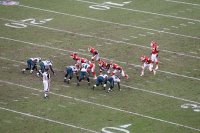What the NFL Scouting Combine Can Teach Us About Teacher Evaluation
Your content has been saved!
Go to My Saved Content.Last week, the National Football League released its schedule for the 2013-14 season, to the joy of die-hard pigskin fans and the chagrin of the rest of America trying to watch their Sunday evening programming. For the last month and a half, teams had been carefully analyzing the results of the NFL scouting combine to see which players best match their system and show the most promise for their future success. (Quick note: the combine is a weeklong display of different workouts and challenges that may demonstrate prospective players' mental and physical abilities.)
Something interesting happened last week, however, that made me think of the current debate on teacher evaluation. NBC's ProFootballTalk blog announced that they would no longer pay much attention to the NFL's renowned Wonderlic test, an exam that purportedly assesses the test taker's ability to solve problems on the spot. A Wonderlic score of 20, for instance, suggests an IQ average of 100. New York Giants' quarterback Eli Manning scored a 39 when he was drafted, and his brother Peyton Manning scored a 28 during his combine.
What this reminded me of is a similar discussion about how we evaluate teachers and their performance in the classroom. Commentators, sportswriters and NFL executives have a myriad of ways to approach their jobs. What can we learn from the NFL about the way they evaluate potential and present teachers and their performance?
We Can't Rely on One Measure
The most obvious part of any talent evaluation in the NFL is that we simply can't depend on just one measure to determine a player's effort on the field. It's not just about how fast they run, how hard they throw the ball, or how much they can bench press in 60 seconds. Even the college they came from can't always determine what they bring to a team.
Evidence on What Builds Great Teams
Often, it's a good understanding of talent combined with fitting into the system and ongoing coaching that can build the player up. Developing good habits -- including learning the best practices on nutrition, exercise, and getting objective and honest feedback -- can really improve a player's performance on the field. The winning-est players don't just rely on their natural ability; they have the habits of mind that keep them working harder every year, and hopefully closer to real success.
Stats and Equations vs. the Team as an Ecosystem
Trying to develop equations for player effectiveness doesn't always work well. ESPN tried to develop its own quarterback equation, but found it wasn't that simple. Each throw a quarterback made or run he scored on needed additional eyes to assure that the numbers accurately reflected his performance. While people may base salaries on individual statistics, the ones that matter most to executives and fans alike are whether the entire team wins.
Looking at teacher evaluation is a difficult prospect, especially since we're often trying to measure the intangibles. Yet we have elements of the profession that we can include in a fair system for all. Characteristics like temperament, persistence and resilience matter more than test scores, especially in schools, because it's here that collaboration, not competitiveness, reigns supreme. Developing schools that see themselves as an ecosystem from teacher all the way through superintendent or chancellor gives us as chance to replicate real success.
Numbers might matter for fantasy leagues and fantasy schools, but in real life, the victory happens together.
